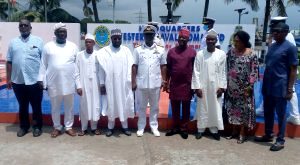The Flag Officer Commanding (FOC) Western Naval Command, Rear Adm. Jason Gbassa, on Friday said that Nigeria recorded only four piracy incidences in the third quarter of 2021.

Gbassa, who made this known at a maritime security meeting with stakeholders in Lagos, said that one of such attacks occurred within the Western Naval Command area of responsibility.
Quoting the International Maritime Bureau (IMB), the FOC said there was over 76 per cent reduction in the incidences of sea crimes.
“Security in the maritime domain witnessed a lot of improvement in the first three quarters of 2021 as compared to the year 2020.
“We have been able to record increased presence at sea which is made possible through a series of initiatives.
“Initiatives such as the prompt allocation of petroleum oil lubrication product, availability of ships which enhance operations and synergy with other stakeholders as well as collaboration with our foreign partners,” he said.
Gbassa said that Nigeria also transited from the secured anchorage area regime operated by a private maritime logistics and security company to the Lagos anchorage area, policed by Nigerian Navy.
“In conjunction with the Nigerian Maritime Administration and Safety Agency (NIMASA) and Nigerian Port Authority (NPA), the Nigerian Navy has been able to effectively secure the anchorage area set for shipping activities.
“In as much as these activities are heart-warming, the Nigerian Navy is not resting on its oars, more so, efforts are ongoing on the recapitalisation of the Nigerian Navy fleet.
“The effort is geared towards having the right set of ships for tasking, including survey vessels to enhance our hydrographic efforts as well as logistics platforms to effectively support our operations,” he said.
The FOC, however, said that one of the prominent challenges facing the command was the lack of a dedicated holding bay for arrested vessels.
He noted that this had made the administration of arrested vessels cumbersome.
“Additionally, many of the ships encountered at sea while on patrol are usually found wanting for minor infractions such as switching off their Automatic Identification System (AIS).
“Arresting such ships could be counter-productive in the long run.
Read Also: Customs Intercepts Live Ammunition, Others With N723m DPV
“Accordingly, efforts can be made to introduce administrative fines of such defaulters in our waters to deter this practices,” Gbassa said.
The Chairman, House of Representatives Committee on Nigerian Navy, Mr Yusuf Gagdi, commended the command for keeping to quality implementation of projects.
“As a committee, we will continue to do our utmost best by allocating resources and revenue to the Nigerian Navy in order to ensure optimal performance in their responsibility,” he said.
The chairman said that the committee was pursuing an amendment in the Armed Forces Act to give power to the Navy to prosecute maritime-related offences.
“This will go a long way at improving the operational and administrational capacity of the Nigerian Navy,” he added.
Gagdi said that the House had passed the Maritime Trust Fund to the Nigerian Navy so that overdependence on the yearly appropriation would be reduced to the barest minimum.
“The trust fund is expected to last for eight years just like we have the Police Trust Fund where money will be generated from some of the maritime-related activities as well as one per cent of the consolidated revenue,” he said.
Gagdi called for more interagency collaboration and advised against interagency rivalry which, he said, existed among stakeholders in the maritime domain.
“The Constitution donates Nigerian sea to the Nigerian Navy because the primary responsibility of Navy is to protect the nation’s integrity by sea.
“Therefore, any agency that is operating in the sea should be subject to the powers of the Nigerian Navy,” he said.
Kindly like us on Facebook
















Discussion about this post